Nurse Remembers 'King of Rock 'n Roll'
By Kristin Rothwell, NurseZone feature writer
This year marks the 25th anniversary of Elvis Presley's death. The man who revolutionized rock 'n roll with his earthy sounds, hip swinging moves and trademark red scarves is remembered by many the world over. And, he has a special place in the heart of one special nurse who provided care to Presley at Baptist Memorial Hospital in Memphis, Tennessee in the mid-70s.
Almost 28 years later, registered nurse Marian J. Cocke can still remember the day Elvis Presley made his way into her life.
It was the second week in January of 1975. Marian, then a unit supervisor on a medical floor at Baptist Memorial Hospital, was asked by Elvis's personal physician, Dr. George Nichopolus, if she would personally care for Elvis. "Dr. Nick," as Marian called him, explained that Elvis was a shy fellow and that it had taken some coaxing to get him to agree to the hospital stay.
Surprisingly, she was not elated about the task, especially since the day Elvis was to arrive was her only day off that week.
Nevertheless, Marian took the assignment.
Two days later, at 4 a.m., Marian received a phone call at home from Dr. Nick. Elvis would be arriving at the hospital shortly, he said. She immediately got out of bed, dressed for the day and drove to Baptist Memorial.
"You can believe this or not, [but when] I walked in on the ground level [of the hospital] I thought, 'Hmm, he's already here,' " she said. "The air was filled with static electricity. As I got closer to [Elvis's] room I felt like I was floating on air. It was the craziest darn thing I've felt in my life."
Inside Elvis's hospital room were Dr. Nick, Joe Esposito (Elvis's road manager), Dick Grob (Elvis's head of security), Linda Thompson (Elvis's then-girlfriend) and Vernon Presley (Elvis's father). They surrounded "the king," who sat on the bed sporting a beard.
As Dr. Nick introduced Elvis to Marian, she interrupted him: "Yeah, I know who this is." Presley grinned at her and she grinned back, thinking, "This is a good kid. He's going to be a part of my life."
*****
Marian grew up an Army "brat." She said that by age 5 she already knew she wanted to be a nurse.
And that's what she did.
Marian graduated from high school in Memphis, Tennessee, in 1943 and in 1949 earned a diploma nursing degree from Holy Name of Jesus Hospital (now Riverview Regional Medical Center) in Gadsden, Alabama. She moved back to Memphis, where she married her husband, Bob, in 1951, and continued practicing nursing—first at the veteran's hospital then at Baptist Memorial.
She worked at Baptist until she retired in 1984. Four years later, the vice president of nursing at Baptist asked Marian if she would come back to work. Marian gladly returned. More than 10 years later, she would take another break from nursing. This time, to care for her daughter, Katey, who lost her battle to cancer last year. Marian found peace in the grieving process by returning to Baptist a few months after Katey's death, where she continues to work today as an administrative house supervisor.
******
The years 1975 to 1977 will likely be the most memorable of Marian's nursing career. Though she openly admits she was never a fan of Elvis's before meeting him, she soon found herself to be a fan and a loyal friend.
On her first day of caring for Elvis, they talked about their likes and dislikes, shared stories about their families and stayed away from talking show business.
"We just clicked," she said, adding that Elvis was an excellent patient who was understanding when she needed to check on the other 50 patients on the floor or tend to her other nursing duties.
Elvis's first hospital stay lasted about three weeks. But not surprisingly, he didn't leave without first saying goodbye to "Miss Cocke," as he called her.
He thanked her with a gold filigreed cross dotted with 13 diamonds and flecks of black onyx on it.
Through tears, she tried to refuse the gift, but Elvis persisted. He simply said, "Yes, ma'am, this is for you" and put it on her.
Several weeks passed before she saw Elvis again. One evening, while driving home from work, she wondered how he was doing.
"It was the darndest thing because Dr. Nick called that night and said, 'Elvis is sick. We're going to bring him back from Las Vegas, would you get a room ready for him?' "
Elvis arrived at Baptist Memorial in seemingly good spirits, even making comments about his flat stomach, and stating, "By the way, Miss Cocke, I've ordered you a car and it will be here tomorrow."

Marian answered, "That's really nice of you Elvis but I don't need a car."
Through a puzzled stare, he replied, "Well, whether you need it or not, it's been ordered and it'll be here tomorrow."
As promised, the next day Elvis interrupted her bed-making duties and told her to look out the window. Following his finger to the 18 floors below, she saw a white 1976 Grand Prix.
He dangled the keys in his hands and Marian quickly grabbed them and a couple of the house supervisors on her way down to see the new car Elvis had purchased for her.
When she returned to the hospital later that night, Elvis said, "Miss Cocke, I just want to tell you one thing. The next time I give you a car, would you remind me that I want to make sure my bed is made before I give you the keys?"
They laughed. Marian said Elvis had the most infectious laugh she'd ever heard.
The next night Elvis returned home to Graceland and Marian followed. She would be his private duty nurse for the next two years while also fulfilling her position as house supervisor at Baptist Memorial.
Refusing to be paid for her private duty nursing, Marian said "Everything I did for Elvis was because I wanted to."
Her tasks while working at Graceland—where she would sometimes roommate with Presley's daughter, Lisa Marie—included checking Presley's blood pressure and dispensing his medications. As his friend and nurse, she would often talk with him through the late hours of the night when he had trouble sleeping.
To dispel any rumors that Presley died of a drug overdose, Marian stated in her book, "I Called Him Babe: Elvis Presley's Nurse Remembers," that all of Presley's medications to treat his hypertension, colon problem, high blood pressure and fluid retention were carefully monitored by Dr. Nick, herself and the other nurses who cared for him.
She added, "If there were other medications ordered by another physician we were not aware of them…There was never a time that I noted any sort of medication abuse or misuse…The coroner's report stated that Elvis died of a heart attack and that he had an enlarged heart. This was no surprise to me. Elvis had the biggest heart of anyone I've ever known."
One morning before Marian headed back to work at Baptist Memorial, she hugged Elvis as she said goodbye. When she reached the door of his bedroom, he said, "Miss Cocke…I just want you to know the doors of this house will always be open for you."
A few mornings later, Presley called and asked her to come by around 4 p.m. before he left Memphis for a concert. He refused to leave for the airport until she arrived. Marian, who noticed fatigue in Elvis's voice, agreed.
At around 3 p.m. that same day, Marian received a call to go to the emergency room. Several doctors, including Dr. Nick, were hastily trying to revive Elvis using CPR. The EKG machine gave the news before the doctor could—no signs of life were evident. On August 16, 1977, Elvis Aaron Presley was pronounced dead at age 42.

As Marian put it in her book, "My boy was gone…"
Today, in Elvis's memory, Marian holds an annual Elvis Presley Memorial Event with all proceeds from her book as well as the event going to charitable organizations including, United Cerebral Palsy, the Special Olympics, Memphis Humane Society, Memphis Baptist Foundation for Indigent Patients, Memphis Cancer Center, Elvis Presley Trauma Center and Presley Place.
This year's 14th annual event, to be held at the Peabody Hotel in Memphis on August 12, expects to draw a crowd of more than 1,000 people. Special guests at the event include Sam Phillips who helped get Elvis on the road to success, friends of Elvis's, as well as entertainment by The Jordanaires, Ronnie McDowell and Terry Mike Jeffrey who will perform music as tributes to Elvis.
In addition to the dinner event, Marian has also had the opportunity to travel nationwide and to Europe to speak to several Elvis Presley fan clubs about her unforgettable experience as Elvis's nurse and friend.
"He certainly changed my life," she said. "There have been a lot of doors opened for me."
One of those doors includes Graceland. Though the home is now a popular tourist attraction, the people behind Graceland, including Priscilla and Lisa Marie Presley, remain part of Marian's family.
"The people at Graceland have certainly been a strength and support for me," she said.
Though "Miss Cocke" wasn't sure about this so-called "King of Rock 'n Roll," she said, "Elvis was my friend and I was protective of him when he was living and I'm still protective of him. He meant a lot to me and he'll always mean a lot to me."
Permission to reprint photos taken by Gil Michael were granted by publisher Marion J. Cocke.© 2002. AMN Healthcare, Inc. All Rights Reserved.

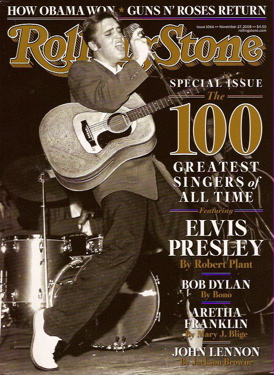 In case you haven't seen the magazine, the top 10 in the poll were: (1) Aretha Franklin, (2) Ray Charles, (3) Elvis Presley, (4) Sam Cooke, (5) John Lennon, (6) Marvin Gaye, (7) Bob Dylan, (8) Otis Redding, (9) Stevie Wonder, (10) James Brown.
In case you haven't seen the magazine, the top 10 in the poll were: (1) Aretha Franklin, (2) Ray Charles, (3) Elvis Presley, (4) Sam Cooke, (5) John Lennon, (6) Marvin Gaye, (7) Bob Dylan, (8) Otis Redding, (9) Stevie Wonder, (10) James Brown.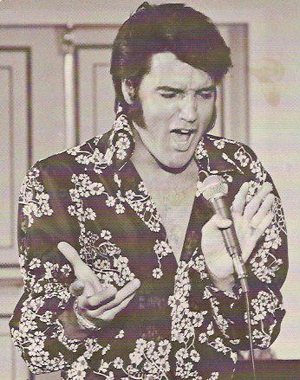 It's presumptuous to think I could better answer the question, "Why was Elvis Presley a great singer?" but I'm going to attempt it anyway. I'm well aware that all Elvis fans have their own favorites among his recordings, and many feel very passionate about them. Recently, I've communicated with fans who have listed the following recordings among their most-treasured Elvis titles: "Where Do You Come From?" "Until It's Time for You to To Go," "Is It So Strange," and "A House That Has Everything."
It's presumptuous to think I could better answer the question, "Why was Elvis Presley a great singer?" but I'm going to attempt it anyway. I'm well aware that all Elvis fans have their own favorites among his recordings, and many feel very passionate about them. Recently, I've communicated with fans who have listed the following recordings among their most-treasured Elvis titles: "Where Do You Come From?" "Until It's Time for You to To Go," "Is It So Strange," and "A House That Has Everything."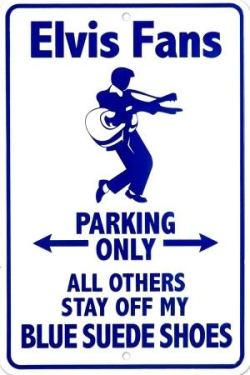
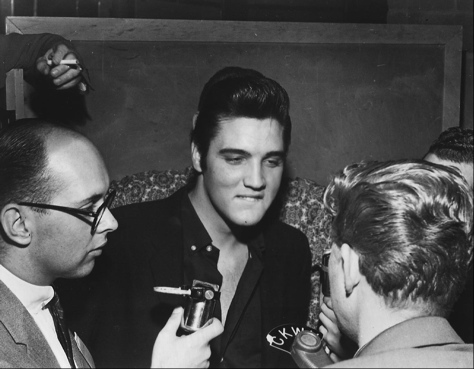


















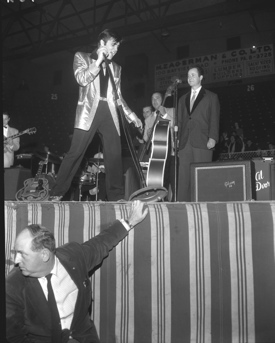 The purpose here is not to recap the relationship between Parker and Presley. That can be found in detail in two Parker biographies published in recent years—Colonel Tom Parker by James Dickerson (2001) and The Colonel by Alanna Nash (2003).
The purpose here is not to recap the relationship between Parker and Presley. That can be found in detail in two Parker biographies published in recent years—Colonel Tom Parker by James Dickerson (2001) and The Colonel by Alanna Nash (2003). 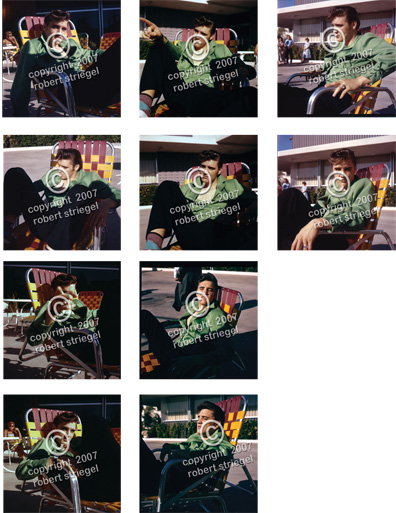
 Recently, however, I decided to give Laurel Goodwin a second look. I watched Girls! Girls! Girls! again, and this time, instead of keeping a eye on Elvis, I focused on Miss Goodwin. By the end of the film, I had developed a new-found respect for her both as an actress and as a screen personality.
Recently, however, I decided to give Laurel Goodwin a second look. I watched Girls! Girls! Girls! again, and this time, instead of keeping a eye on Elvis, I focused on Miss Goodwin. By the end of the film, I had developed a new-found respect for her both as an actress and as a screen personality. 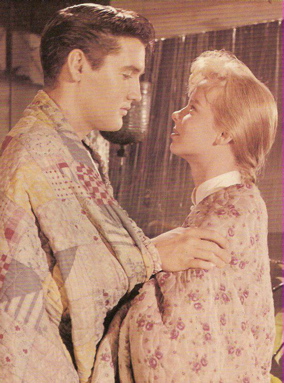 Laurel Goodwin was born August 11, 1942, in Wichita, Kansas. She was a child model and later studied acting before signing on at Paramount as a contract player. Hal Wallis spotted her and cast her in Girls! Girls! Girls! "When I learned I was going to do the role, I was a little hesitant, startled, stunned and nervous," she explained in a Photoplay magazine article some years later.
Laurel Goodwin was born August 11, 1942, in Wichita, Kansas. She was a child model and later studied acting before signing on at Paramount as a contract player. Hal Wallis spotted her and cast her in Girls! Girls! Girls! "When I learned I was going to do the role, I was a little hesitant, startled, stunned and nervous," she explained in a Photoplay magazine article some years later.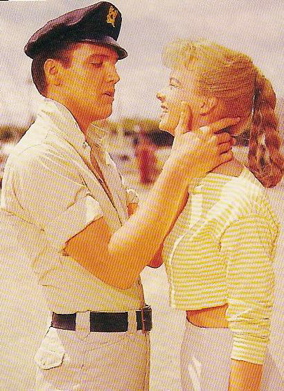 Like a big brother, Elvis was protective of Laurel Goodwin. In the Photoplay article, she explained that during filming a boyfriend started giving her a hard time. Without telling her, Elvis stopped the trouble by sending a member of his entourage to tell the boyfriend to cool it.
Like a big brother, Elvis was protective of Laurel Goodwin. In the Photoplay article, she explained that during filming a boyfriend started giving her a hard time. Without telling her, Elvis stopped the trouble by sending a member of his entourage to tell the boyfriend to cool it. 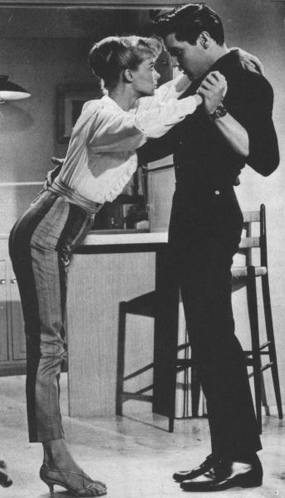 One filmed sequence in Girls! Girls! Girls! might have made a distinct impression on Laurel Goodwin, but if so, she was discreet enough not to mention it in public through the years. Thus Laurel Goodwin participated in what may be the most bizarre scene in all of Presley's 31 Hollywood films.
One filmed sequence in Girls! Girls! Girls! might have made a distinct impression on Laurel Goodwin, but if so, she was discreet enough not to mention it in public through the years. Thus Laurel Goodwin participated in what may be the most bizarre scene in all of Presley's 31 Hollywood films.